I met a few friends for a book club at a diner over the weekend. We discussed The Men’s Club1 over pancakes and coffee. It was delightful.
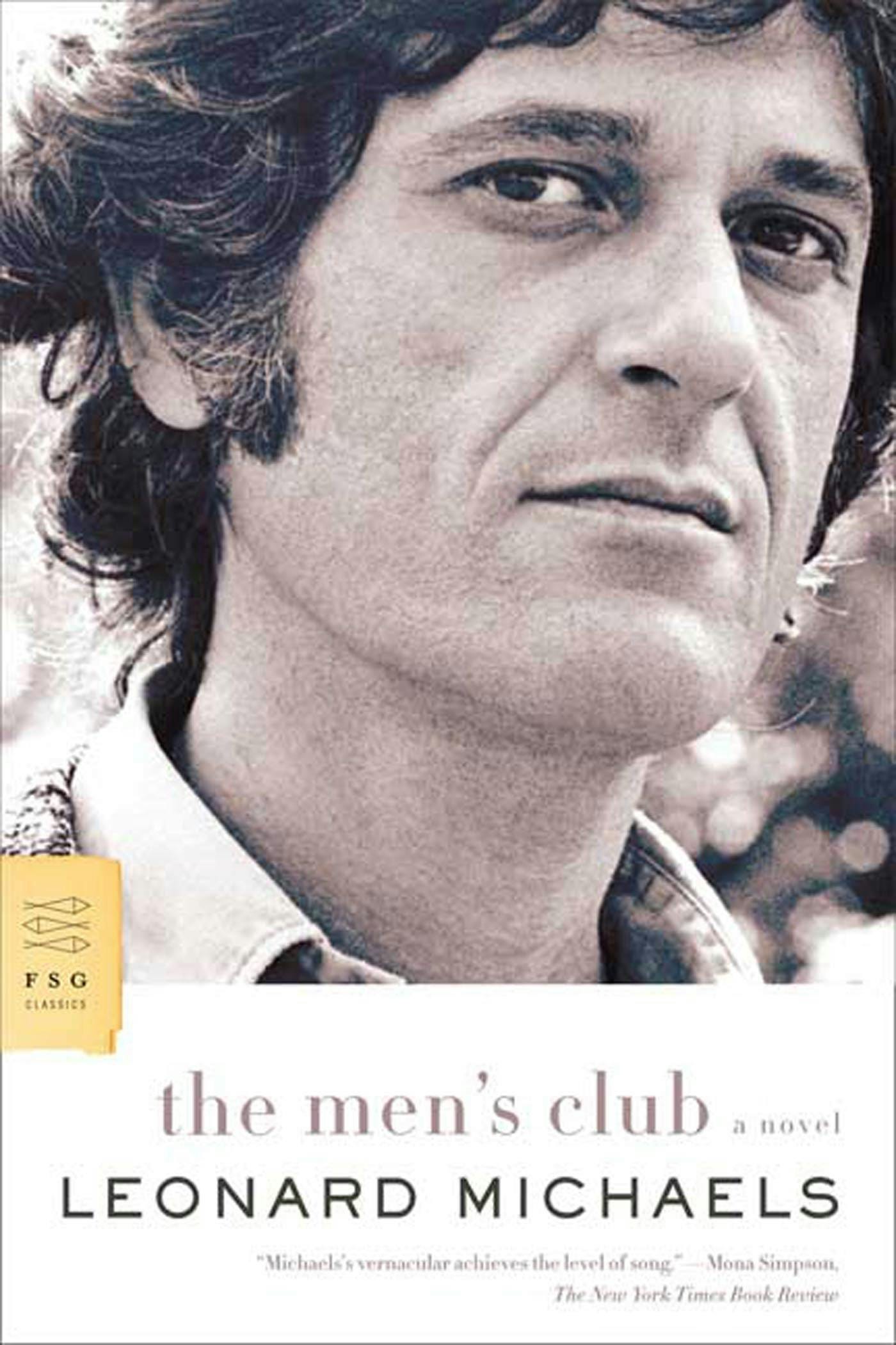
My friend Andrew organized the group and introduced the book’s author, Leonard Michaels, as “a writer’s writer.”
The term is funny. It’s a compliment but connotes someone who spends their life wrestling with the demons that come with artistry; it is hard to imagine a writer’s writer who had a particularly happy childhood. It implies someone who is innovative but not commercially successful. Someone who has not been swept up into the stratosphere of the small number of superstars that power-law arenas like the arts produce, so they don’t inspire resentment among their colleagues.
It made me think of the excellent New Yorker Fiction Podcast2, in which a writer picks out a different writer’s short story from the New Yorker’s archives to read aloud and discuss with the host,
. Treisman is The New Yorker’s fiction editor, has a voice like a mug of earl grey tea, and seems extremely cool.3I imagine if you go on the show as a writer and are considering whose short story to pick, you want to:
Pick someone whose work you love which will be interesting to discuss
Signal your own good taste by picking someone cool / interesting / not well-known
Avoid picking someone you perceive as a rival or are envious of
Which one of these criteria dominates depends on where you are in your career and how mentally healthy you are.
My friend Andrew is himself a novelist (widely known as a “Joe’s Substack writer’s writer,” among other things). You should buy his most recent book, especially if you happen to run a prestigious artist residency or be the fiction editor at the New Yorker. I asked him to weigh in on possible writer’s writers featured in the podcast:
His endearingly formal response aligns quite well with the data. It stands to reason that the quintessential writer’s writer would:
Be chosen by lots of other writers on the New Yorker Fiction Podcast
Not be widely famous; I use Wikipedia views since the start of the podcast as a proxy here
These are the writers whose stories are most frequently read across the 200+ episodes of the podcast, along with their Wikipedia views:
My favorite episode of the show is Rebecca Curtis reading Haruki Murakami’s Confessions of a Shinagawa Monkey. Sorry I’m basic!!! Murakami has the most Wikipedia views of any of the most-chosen writers and is too commercially popular to be a true writer’s writer (although perhaps because he’s in Japan and famously avoids the literary scene, he inspires less envy than his peers in New York).
Looking at the writers featured on the show as a scatter plot, we can see the zone in the bottom right occupied by the writer’s writers — esteemed by their peers, and not too famous:
There are a few edge cases based on this classification. I expect
’s days as a writer’s writer are numbered as she is becoming too famous; her book All Fours will dot the picnic blankets of Prospect Park during the next warm day in Brooklyn. Dua Lipa interviewed , which should be disqualifying. But his recent book analyzing Russian short stories, A Swim in the Pond in the Rain, was so good that I will look the other way.The quintessential writer’s writer seems obvious, though: it’s gotta be Donald Barthelme, based on the following evidence:
His short stories have been chosen by other writers on the New Yorker Fiction Podcast more than anyone else
He only has ~400k wikipedia views over the past 14 years, compared to
’s nearly 10 million or Franz Kafka’s 15 million (who knew all these famous writers had substacks! Imagine Kafka restacking you…)I had never heard of him
Besides, he looks like a writer’s writer:
I listened to this episode of Salman Rushdie reading one of his stories, on Treisman’s recommendation: “what a thrill, for instance, to hear Salman Rushdie, who spent years of his life with bodyguards, make Donald Barthelme’s absurdist story “Concerning the Bodyguard” feel all too real.”
Rushdie has a wonderful reading voice and he actually refers to Barthelme as a “writer’s writer” in the episode, though he “hates to use the term.” He also tells a story about meeting Barthelme years ago in a hotel in 1986 when Barthelme was “colossally drunk” —100% writer’s writer behavior. I highly recommend the episode.
Some of my other favorites are:
Two Murakami stories: Rebecca Curtis reading Confessions of a Shinagawa Monkey, which I mentioned above — this will make you desperately want to take a solo trip to a Japanese hot spring town (where all is not as it seems…). If you want something spookier, Andrea Lee reading Barn Burning is wonderful; the story inspired the movie Burning, which was an awesome adaptation.
Louise Erdrich reading Lorrie Moore. Moore has been chosen by 4 authors, and this story is particularly sad and beautiful.
Karl Ove Knausgaard reading V.S. Naipaul. For some reason the idea of Knausgaard going on a podcast seems incongruous to me, like it doesn’t make sense that he’s alive in the same era as this technology, but his lilting norwegian growl is like black coffee next to Treisman’s earl grey and it’s fun to hear how he thinks.
Thanks for reading! And thank you to those of you who donated to the Massachusetts ACLU or the Center for Constitutional Rights last week.
If you enjoyed this post, you’d probably like this one about which book clubs are the most powerful or this one about the Literature Map.
As it’s warming up in new york i’m having fun being outside and taking pictures. I never feel more like a NIMBY than when trying to photograph the Chrysler building, which is so beautiful and has lots of really ugly newer buildings around it. But I liked this one from last night in LIC, which manages to avoid the clutter of Times Square behind it.
I enjoyed Men’s Club, but only recommend it if the concept of the movie “Old School, but for MFAs” appeals to you
Because this article deals with podcasts I should note that all of these opinions and data are my own, and are separate from those of my employer




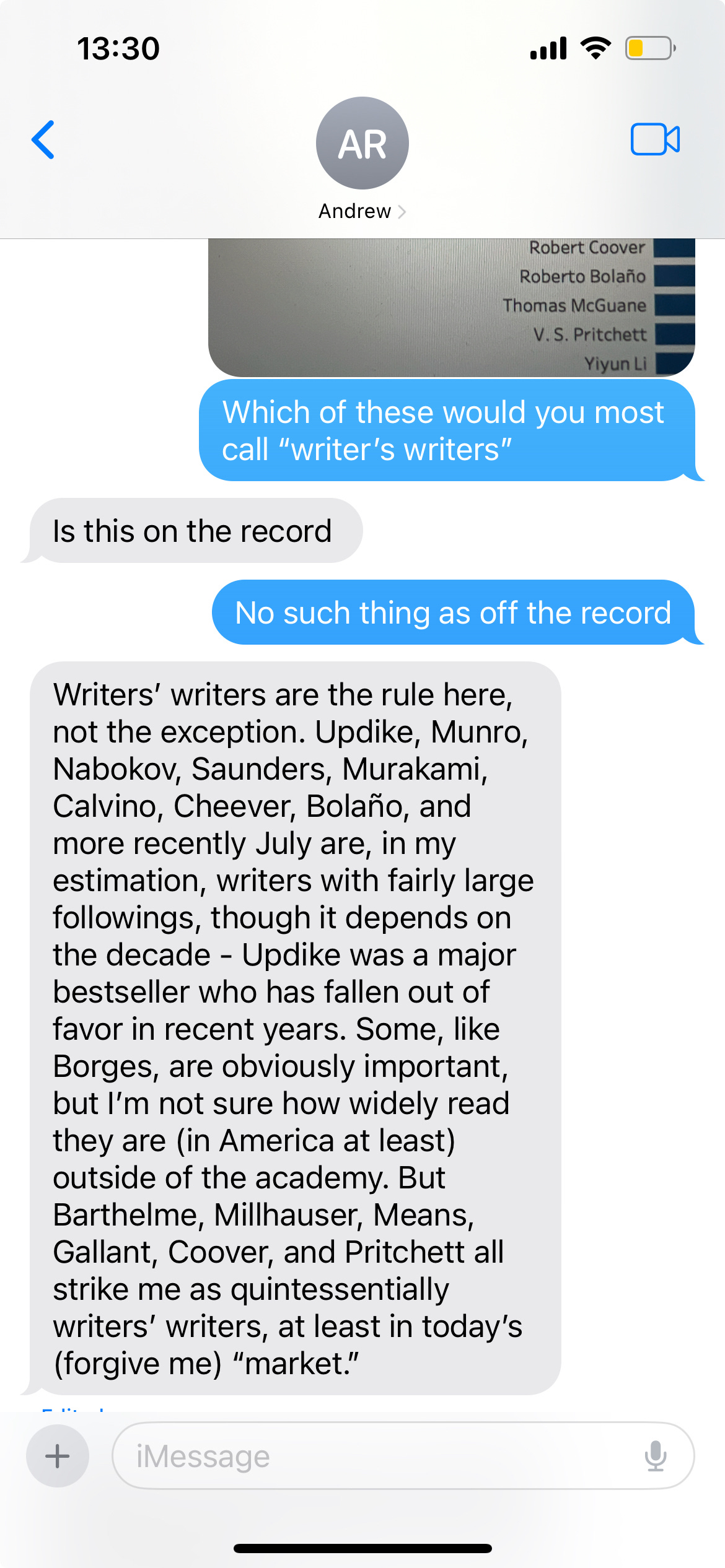
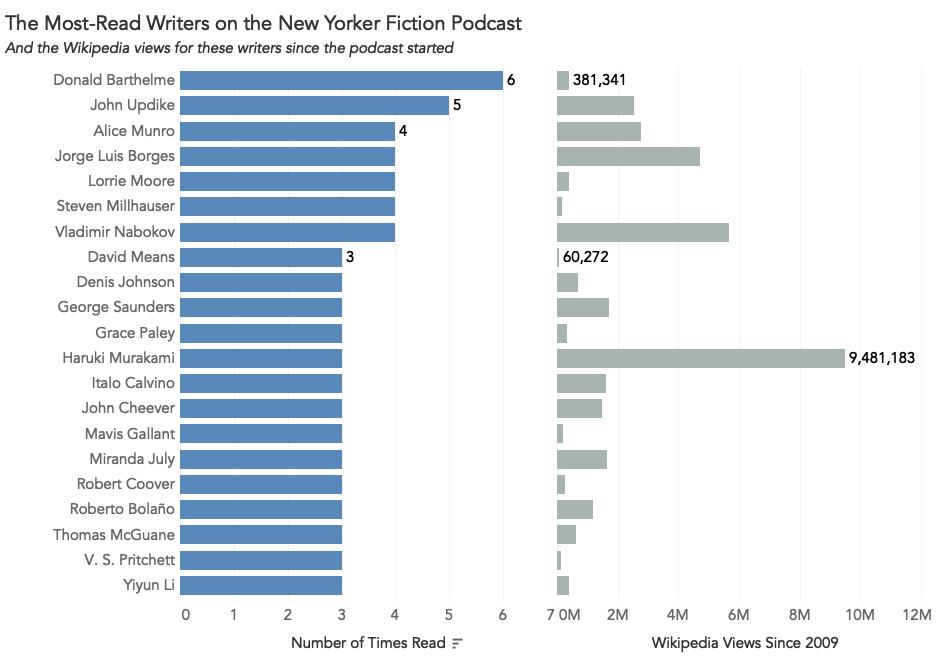
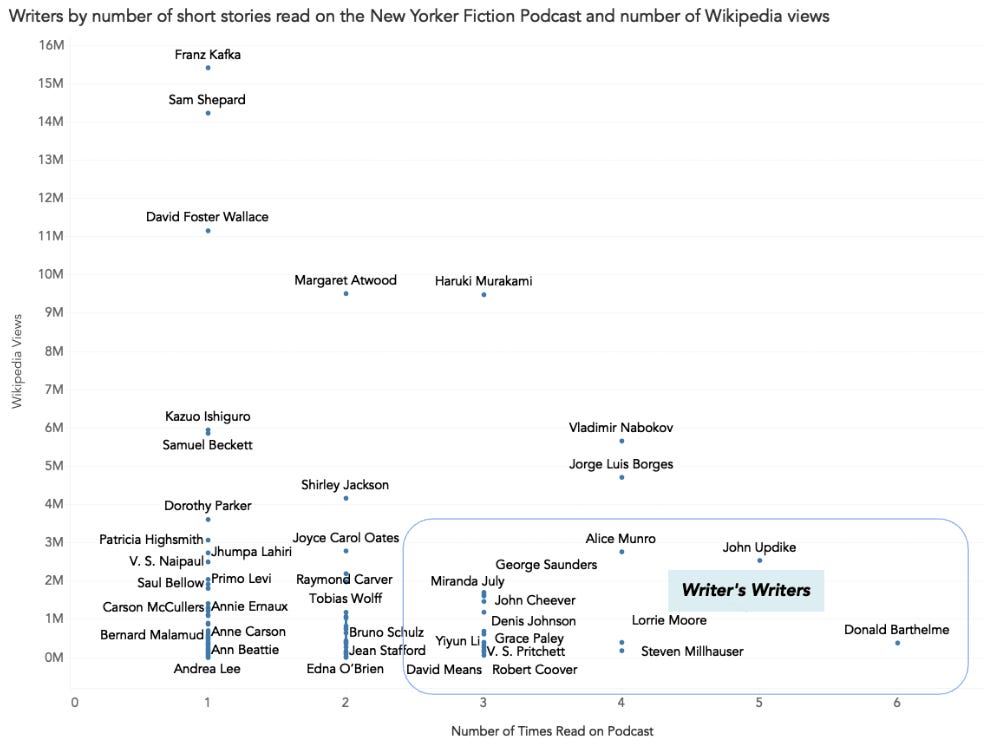
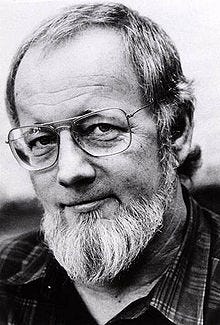
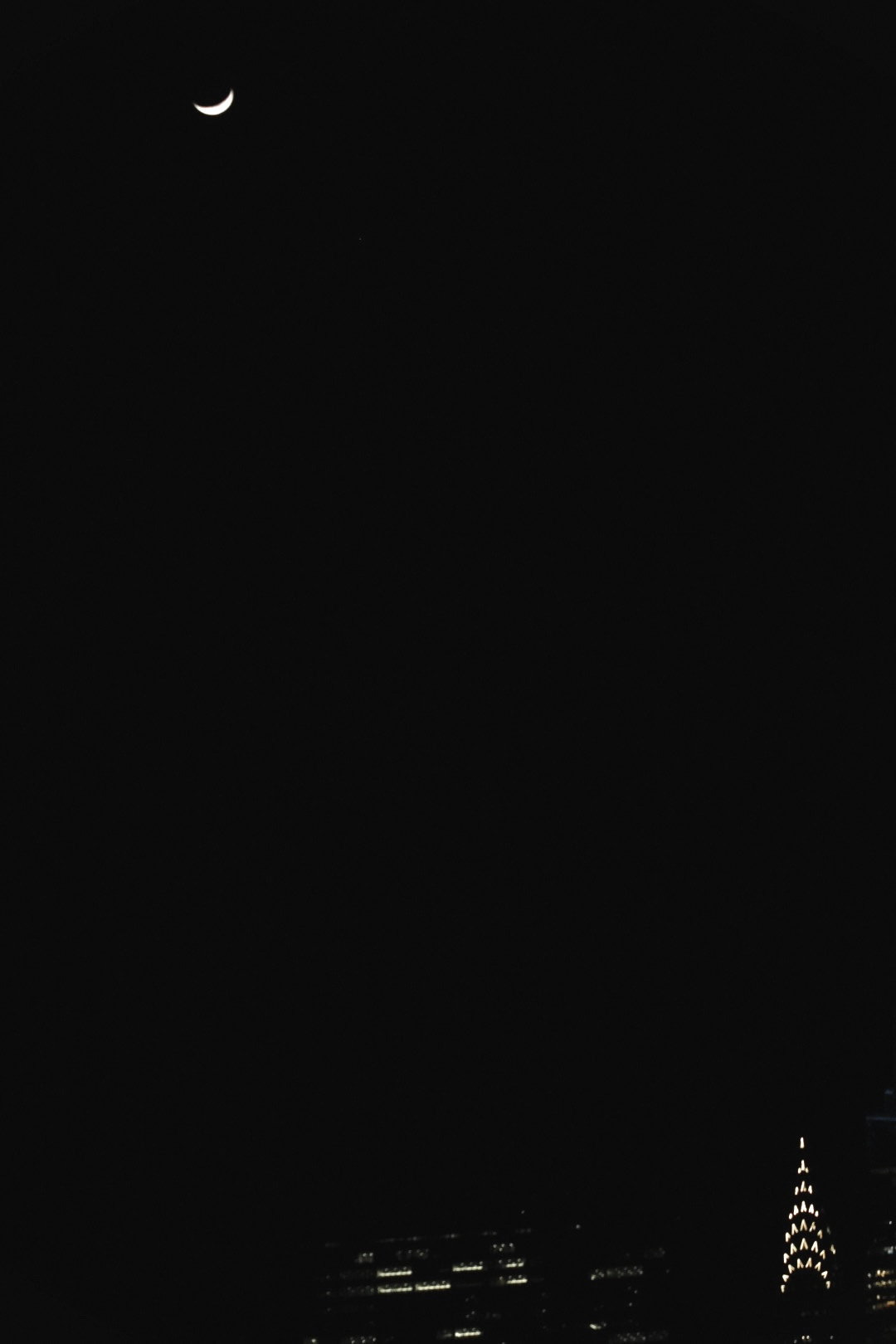
Great post Joe. I recommend Murakami's biography, What I talk about when I talk about running. Incidentally, he teaches literature in the US occasionally (Boston) and splits his time between Boston and Japan - he also spends quite a bit of time in Hawaii, (or at least did when writing the biography).
He does look like a writer's writer! Data request if you're game for a future post.... who is the best travel blogger/writer for off the beaten path travel recommendations?